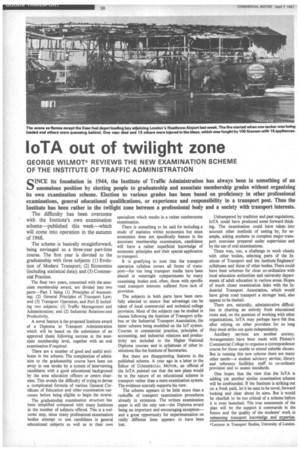loTA out of twilight zone
Page 38

If you've noticed an error in this article please click here to report it so we can fix it.
GEORGE WILMOT* REVIEWS THE NEW EXAMINATION SCHEME OF THE INSTITUTE OF TRAFFIC ADMINISTRATION
SINCE its foundation in 1944, the Institute of Traffic Administration has always been in something of an anomalous position by electing people to graduateship and associate membership grades without organizing its own examination scheme. Election to various grades has been based on proficiency in other professional examinations, general educational qualifications, or experience and responsibility in a transport post. Thus the Institute has been rather in the twilight zone between a professional body and a society with transport interests.
The difficulty has been overcome with the Institute's own examination scheme—published this week—which will come into operation in the autumn of 1968.
The scheme is basically straightforward, being envisaged as a three-year part-time course. The first year is devoted to the graduateship with three subjects: (1) Evolution of Modern Transport; (2) Economics (including statistical data); and (3) Commercial Practice.
The final two years, concerned with the associate membership award, are divided into two parts—Part I being (1) Principles of Accounting; (2) General Principles of Transport Law; and (3) Transport Operation, and Part II including two subjects: (1) Traffic Management and Administration; and (2) Industrial Relations and Productivity.
A novel feature is the proposed Institute award of a Diploma in Transport Administration which will be based on the submission of an approved thesis following success at the associate membership level, together with an oral examination if required.
There are a number of good and useful attributes in the scheme. The complexities of admission to the graduateship course have been cut away in one stroke by a system of interviewing candidates with a good educational background by the area education officers or centre chairmen. This avoids the difficulty of trying to devise a complicated formula of various General Certificate of Education and other examination successes before being eligible to begin the course.
The graduateship examination structure has been simplified compared with many Institutes in the number of subjects offered. This is a welcome step, since many professional examination bodies attempt to test candidates in general educational subjects as well as in their own specialism which results in a rather cumbersome examination.
There is something to be said for including a study of statistics within economics but since economics does not specifically feature in the associate membership examination, candidates will have a rather superficial knowledge of economic principles and their special application to transport.
It is gratifying to note that the transport operation syllabus covers all forms of transport—for too long transport media have been placed in watertight compartments by many examining bodies and, often, those with specific road transport interests suffered from lack of provision.
The subjects in both parts have been carefully selected to ensure that advantage can be taken of local commercial and technical college provision. Most of the subjects can be studied in classes following the Institute of Transport syllabus or the Industrial Transport Association, the latter scheme being modelled on the IoT system. Courses in commercial practice, principles of accounting, and industrial relations and productivity are included in the Higher National Diploma courses and in syllabuses of other institutions like the Institute of Secretaries.
But there are disappointing features in the published scheme. A year ago in a letter to the Editor of COMMERCIAL MOTOR, an official of the IoTA pointed out that the new plans would be in the nature of an educational scheme in transport rather than a mere examination system. The evidence scarcely supports his view.
The scheme appears to be little more than a reshuffle of transport examination procedures already in existence. The written examination paper is still the only test—the Diploma award being an important and encouraging exception— and a great opportunity for experimentation on really different lines appears to have been lost. Unhampered by tradition and past regulations, IoTA could have produced some forward thinking. The examination could have taken into account other methods of testing by, for example, asking students to complete major transport exercises prepared under supervision and by the use of oral examinations.
There was, too, a challenge to work closely with other bodies, selecting parts of the Institute of Transport and the Institute Engineers' syllabuses and those of other bodies. There could have been schemes for close co-ordination with local education authorities and university departments of adult education in various areas. Hopes of much closer examination links with the Industrial Transport Association, which would have given road transport a stronger lead, also appear to be dashed.
There are, naturally, administrative difficulties in charting an entirely fresh educational route and, on the question of working with other organizations. IoTA may perhaps have felt that after relying on other providers for so long they must strike out quite independently.
Ancillary services are another anxiety. Arrangements have been made with Pitman's Commercial College to organize a correspondence course for those unable to attend suitable classes. But in running this new scheme there are many other needs—a student advisory service; library and reference facilities; staff to co-ordinate provision and to assess standards.
One hopes that the view that the IoTA is adding yet another similar examination scheme will be confounded. If the Institute is striking out on a fresh path, let it be seen to be novel, forward looking and clear about its aims. But it would be churlish to be too critical of a scheme before it is even launched. The true assessment of the plan will be the support it commands in the future and the quality of the students' work in enhancing transport knowledge and expertise.
*Lecturer in Transport Studies, University of London.
































































































































































